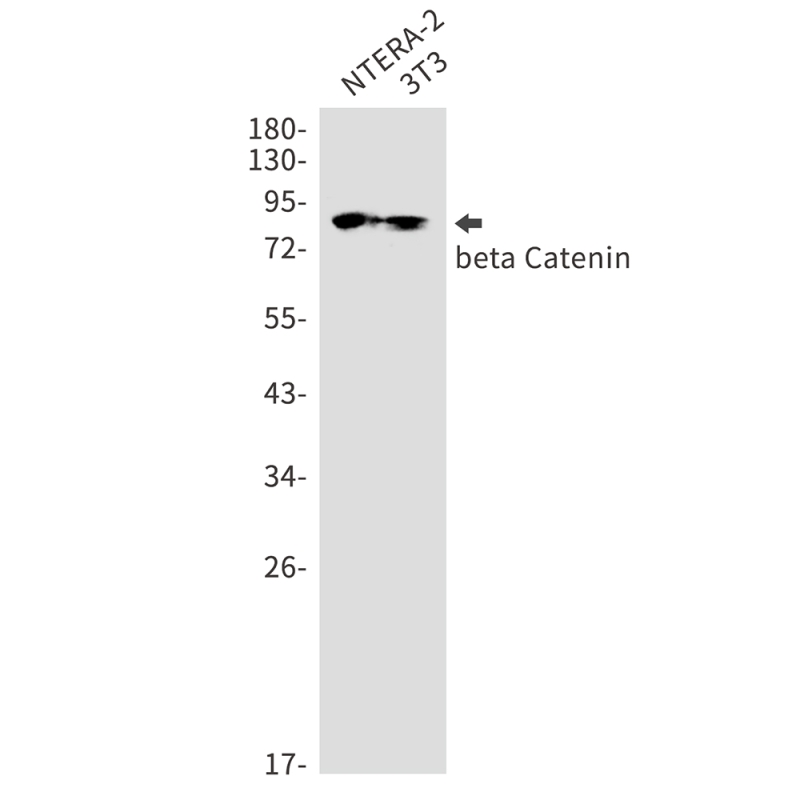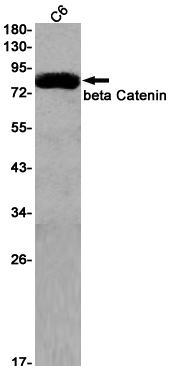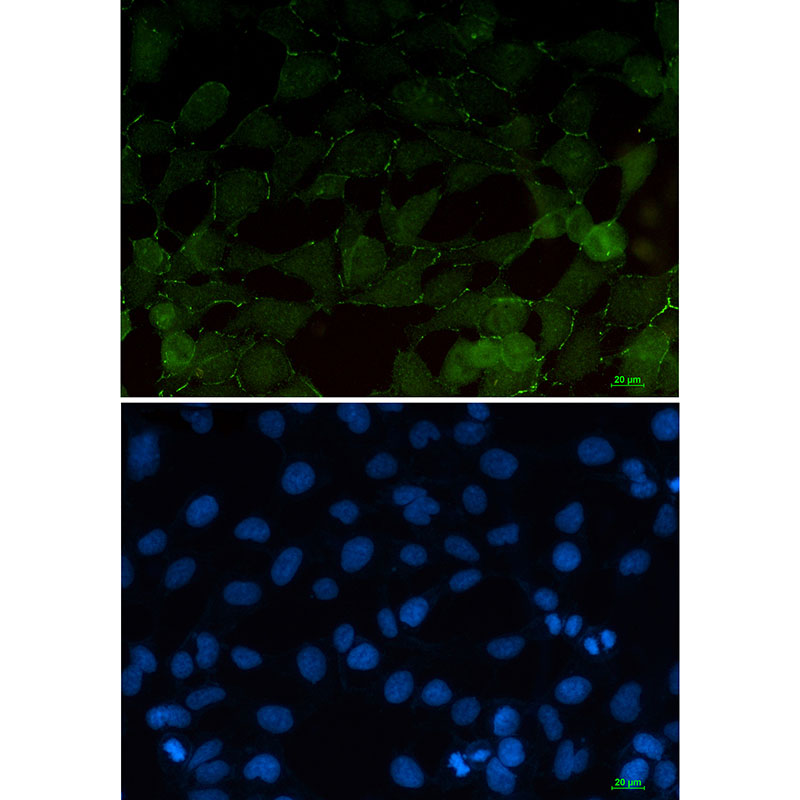


| WB | 1/500-1/1000 | Human,Mouse,Rat |
| IF | 咨询技术 | Human,Mouse,Rat |
| IHC | 咨询技术 | Human,Mouse,Rat |
| ICC | 1/50-1/200 | Human,Mouse,Rat |
| FCM | 咨询技术 | Human,Mouse,Rat |
| Elisa | 咨询技术 | Human,Mouse,Rat |
| Aliases | CTNNB1; CTNNB; OK/SW-cl.35; Catenin beta-1; Beta-catenin |
| Entrez GeneID | 1499 |
| WB Predicted band size | Calculated MW: 85 kDa; Observed MW: 85 kDa |
| Host/Isotype | Rabbit IgG |
| Antibody Type | Primary antibody |
| Storage | Store at 4°C short term. Aliquot and store at -20°C long term. Avoid freeze/thaw cycles. |
| Species Reactivity | Human,Mouse,Rat |
| Immunogen | A synthetic peptide of human beta Catenin |
| Formulation | Purified antibody in TBS with 0.05% sodium azide,0.05%BSA and 50% glycerol. |
+ +
以下是3篇关于β-Catenin抗体的参考文献,涵盖不同研究场景:
1. **文献名称**:*Wnt/β-catenin signaling and disease*
**作者**:Clevers, H., & Nusse, R.
**摘要**:综述Wnt/β-catenin信号通路在发育和疾病(如癌症)中的作用,重点讨论了β-catenin抗体的应用(如Western blot、免疫组化)在检测其核定位及表达水平中的关键作用。
2. **文献名称**:*Nuclear localization of β-catenin in colonic adenocarcinoma*
**作者**:Shapiro, L., et al.
**摘要**:通过免疫组化使用β-catenin抗体,揭示结肠癌细胞中β-catenin异常核积累与肿瘤进展的关联,验证了抗体在病理诊断中的应用价值。
3. **文献名称**:*β-Catenin regulates primordial germ cell development in zebrafish*
**作者**:Koch, A., et al.
**摘要**:利用斑马鱼模型,通过β-catenin抗体进行免疫荧光染色,证明其在胚胎发育中调控原始生殖细胞迁移的功能,突出了抗体在发育生物学研究中的实用性。
4. **文献名称**:*Targeting β-catenin phosphorylation in HEK293T cells*
**作者**:van Noort, M., & Clevers, H.
**摘要**:研究β-catenin磷酸化对其稳定性的影响,通过Western blot和免疫沉淀(IP)结合特异性抗体,阐明其在Wnt信号传导中的分子机制。
这些文献均涉及β-catenin抗体的实验方法(如WB、IHC、IF等)及在癌症、发育生物学中的功能研究,可作为相关实验设计的参考依据。
Beta-catenin is a multifunctional protein that plays pivotal roles in both cell-cell adhesion and Wnt signaling pathways. As a key component of adherens junctions, it binds to cadherins, linking them to the actin cytoskeleton to maintain tissue architecture. In the canonical Wnt pathway, beta-catenin acts as a transcriptional co-activator. In the absence of Wnt signals, cytoplasmic beta-catenin is phosphorylated by a destruction complex (APC, Axin, GSK3β) and targeted for proteasomal degradation. Wnt activation disrupts this complex, allowing beta-catenin to accumulate and translocate to the nucleus, where it partners with TCF/LEF transcription factors to regulate genes involved in cell proliferation, differentiation, and embryonic development.
Beta-catenin antibodies are essential tools for studying its dual functions. They enable detection of beta-catenin localization (membrane-associated vs. nuclear/cytoplasmic pools), expression levels, and post-translational modifications across techniques like Western blot, immunohistochemistry, and immunofluorescence. These antibodies are particularly valuable in cancer research, as aberrant Wnt signaling—characterized by nuclear beta-catenin accumulation due to mutations in APC, CTNNB1 (beta-catenin gene), or other pathway components—is implicated in numerous cancers, including colorectal, hepatocellular, and breast carcinomas. Additionally, beta-catenin antibodies help investigate developmental biology, tissue homeostasis, and diseases involving cell adhesion defects. Specific epitope-targeting antibodies (e.g., recognizing active unphosphorylated forms) further dissect its signaling status. Validation across species and applications remains crucial due to context-dependent protein behavior and cross-reactivity risks.
×